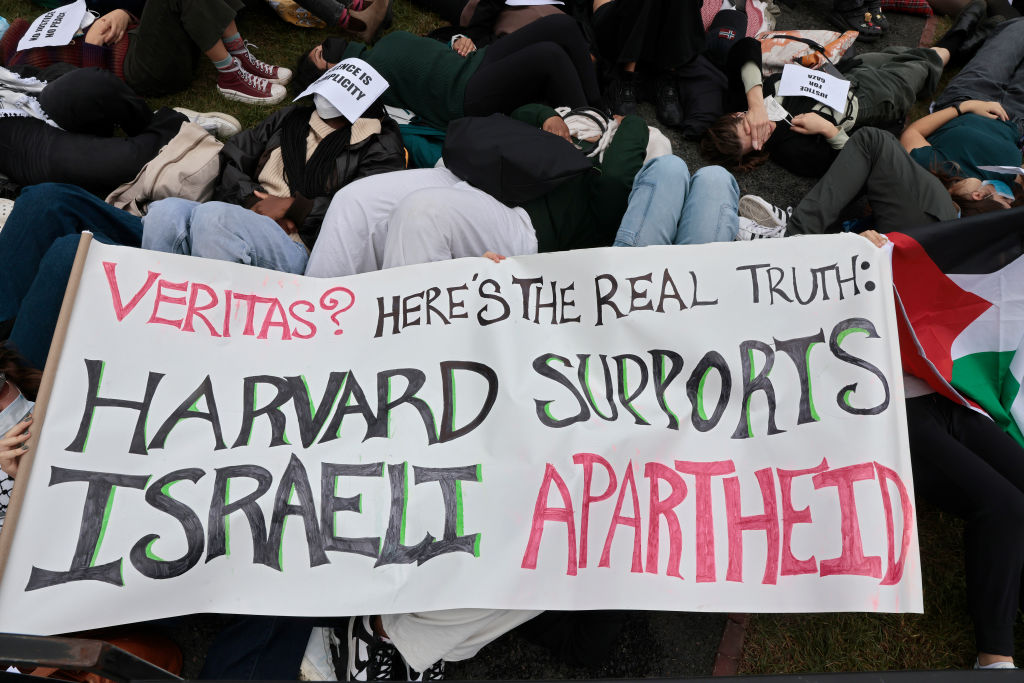In the weeks following the largest killing of Jews since the Holocaust, a chilling double standard has emerged on campuses across the country. At Columbia, which endeavors to center “diversity, equity and inclusion” in “all interactions with individuals, organizations and communities that we serve,” an Israeli student was allegedly beaten with a stick by a 19-year-old woman who was tearing down posters of hostages taken by Hamas.
At George Washington University, where the supposedly insensitive “Colonials” mascot was recently dropped, students projected anti-Israel messages onto a campus library, including “Glory to our martyrs.”
At a “die-in” protest at Harvard, a law student and a divinity school student—the latter of whom serves as a proctor mentoring undergraduates, a role that Harvard calls “crucial … in building a safe, healthy and inclusive environment for all first-year students”—accosted an Israeli business school student as surrounding protesters shouted “SHAME.”
Many college students and professors at elite universities like to fashion themselves as proponents of social justice. But since Hamas’ October 7 attack on Israel, this righteous self-branding has hit a sinister inflection point. It raises the question: How can so many so-called “progressives” give the Hamas attacks a moral pass while screaming inclusion from the rooftops?
Those who support these types of fringe progressive causes and displays don’t actually want inclusion for everyone, of course. But they do defend their viewpoints using moralistic language—like inclusion, justice, equity, and resistance—while vilifying those of others and shutting down debate. In the case of radical pro-Palestinian activists on campus, moralizing words try to excuse overt antisemitism and the use of terror against civilians as a noble resistance. An October 9 statement from a group of Columbia students said that “despite the odds against them, Palestinians launched a counter-offensive against their settler-colonial oppressor,” and that anyone labeling the attack “unprovoked” is “asking for quiet submission to systemic violence.”
This has long been a tool of the progressive orthodoxies on campus: Couching terms in the jargon of morality is both self-protective and generates an illusion of legitimacy. In a 2021 interview about free speech on campus, Steven Pinker, a cognitive psychologist and Harvard professor, explained the psychology behind moralistic behavior, telling me that humans want to be on the “right” side of an issue—even when it might not be the morally correct position. “Moralistic efforts are those that attempt to claim superiority and demonize opponents,” he said.
Impressionable students easily fall prey to stances uttered with moral certainty, especially when they aren’t challenged in open discourse. When I graduated from Harvard in 2021, moralistic speech was most commonly applied to support the “defund the police” movement. Though behind closed doors I could question the prudence of entirely dismantling police departments, publicly I feared being branded as insensitive or even racist for being opposed to the abolishment of the Harvard University Police Department. Now, as in the past, pro-Israel students run the risk of being branded as complicit with “the apartheid regime.” What reputation-weary college student would want to be branded an “oppressor?”
Some professors have excused and even endorsed hateful acts with moralistic language. Columbia professor Joseph Massad praised “the resistance’s remarkable takeover of Israeli military bases and checkpoints” and labeled the “capture of some of Israel’s colonial soldiers” as “striking” and “awesome.” Saying something so utterly hateful with the authority of your professorship shuts down debate. Students aren’t left wondering who is supposed to be good and evil, or even if there is any nuance.
This moralistic language can’t help but appear ironic at best. In their book The Coddling of the American Mind, Greg Lukianoff and Jonathan Haidt explore how American schools increasingly prioritize “safety” over practicality, trying to insulate students from all harm—especially psychological. Lukianoff explained to me in an interview that when students say they feel unsafe, they often mean that “they feel uncomfortable.” This makes safety too subjective and “prone to bias and abuse,” especially by progressive orthodoxies.
But just take a look at what is safe and unsafe by today’s standards. Lukianoff questions the sincerity of a framework that deems microaggressions as unsafe while student activists are “shouting ‘Intifada’ … or that Israel entirely earned these monstrous attacks.” And despite so many efforts to create “safe spaces,” students on both sides are facing safety issues on campus, like the alleged beating at Columbia and the doxxing taking place at Harvard against pro-Palestine students.
To be clear, not all progressive students engage in this kind of faux-moralizing. “I think that the fact that the student groups are pushing explicitly anti-Zionist platforms goes against what I would see as progressive,” says Sam Meyerson, a self-described progressive student at Harvard Law School and a former classmate. Meyerson sees a logical inconsistency in the so-called progressive anti-Zionist protests. He says they point to “a growing illiberalism in certain progressive circles that invalidates the broader liberal goals of the progressive movement as a whole.”
Yet there is great hubris among the kind of university members who go around labeling viewpoints right and wrong based on their own inclinations. In a Harvard student letter that blamed Israel for the attacks, many organizations signed on without consensus from their members, some retracting their signature after pushback ensued. This kind of blanket moralizing endangers Jewish and pro-Palestinian students alike. I’ve spoken to a student on campus who is being doxxed because of a past—and loose—affiliation with one of the organizations that endorsed the letter, despite having no clue that leadership was going to support it. Radically pro-Palestine students who blame Israel for the attacks also destroy nuanced debate, crowding out reasonable critiques of Israel.
For Meyerson, some pro-Palestinian members of campus are looking at social justice in a “myopic sense.” While their movement rightfully focuses on the pain of the civilian Palestinian population of Gaza, it neglects to extend the same compassion to Israeli hostages and victims of Hamas. But Meyerson “supports social justice for both sides.” “That is the more logically consistent liberal position,” he adds.
Students and faculty who demand to get rid of insensitive mascots or shout down controversial speakers may have good intentions, however misguided they may seem over the past few weeks. But today, some of those same advocates are cheering on terrorists and menacing their peers. The next time they ask for diversity, equity, and inclusion, we should wonder: for whom?






Please note that we at The Dispatch hold ourselves, our work, and our commenters to a higher standard than other places on the internet. We welcome comments that foster genuine debate or discussion—including comments critical of us or our work—but responses that include ad hominem attacks on fellow Dispatch members or are intended to stoke fear and anger may be moderated.
With your membership, you only have the ability to comment on The Morning Dispatch articles. Consider upgrading to join the conversation everywhere.